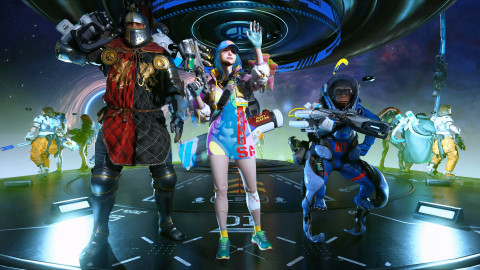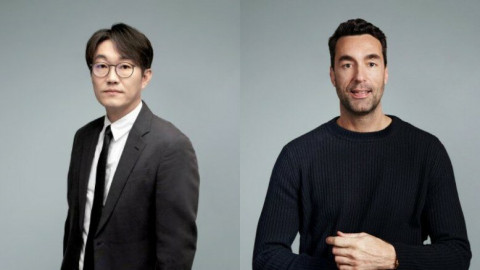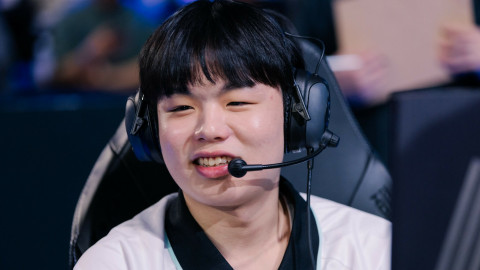
It was a hot summer day at LoL Park when colleagues and I went to grab a meal before we began the day’s coverage. As usual, we talked esports, and suddenly, a woman who was sitting next to us carefully approached us to ask the following.
“You must be working in the game industry. May I ask something?” Her story involved her son, who is in middle school. He had recently expressed his intention of wanting to become a pro gamer and is now begging her to send him to an esports academy. Her story was short, but it invoked a realization within us. A parent coming to us to express her worry of her middle school child wanting to become a pro gamer shows us that esports has indeed become more influential than ever. What’s more important is that this interest is seemingly shone only in its light while completely ignored in its shadow.
What’s clear is that most parents of middle to high school kids do not have enough information about what makes an esports career. To this woman’s request, we wanted to give an answer that wasn’t just oversimplified, as we felt it wasn’t right to do so. We felt the need to deliver a real-world information on the matter.

Some of the most accessible ways for students to cope with academic stress from daily school lives lie within PC gaming. It’s difficult to find a home without a computer these days, and gathering friends to play a game or two can be done easily online. It’s also less consuming physically. PC gaming is perhaps one of the most efficient hobbies the modern kid can have for his after school hours.
Many teenagers play video games. Even the current marketing trend for gaming developers admit to prioritizing their interests around teenagers more than any other age group. With this in mind, the job title known as pro gamer, which first came into existence about 20 years ago is now one of the most desired career paths for the younger generation. With the ability to make money whilst playing video games, in addition to a solid infrastructure available for professional players - and let’s not forget to mention the amount of wealth and fame that compares with today’s sports stars and celebrities, make it reasonable enough that young people understandably want to pursue a career in this path that they really believe they can enjoy.
However, statistics show that ‘the pro gamers’ we speak of only might represent the top 1~5% of the much larger pool of professional players. We see only what we can see, and it’s much easier to ignore the shadow in favor of its light. That is why more and more teenagers are diving into this idea of play-games-and-make-money lifestyle without fully understanding as to how this all works.

Some students say they want to be a pro gamer as it crosses their minds. It’s like when you buy a bicycle for your kid, only to find it glued to the home garage after a week. When you buy him the most trendy jacket, and suddenly he doesn’t want to wear it when you bring it out next year. Teenagers can be the quite capricious kind.
Knowing that, there are a few occasions where the teenager comes with more intent as he expresses ‘this something’ isn’t like the bike nor the jacket he forgot he had. As a parent, careful insight is needed to decipher whether this, indeed, is something that can be followed upon.
My mother was the same. It was the first time I had wanted to become something without anyone convincing me of doing. I wanted to become a pro gamer. I expressed my desire to my parents with detailed objectives that I had in mind. It was probably the first time I had this sort of conversation with them. Though it can be a struggle, most parents should, in the end, be able to determine how genuine their kid is in their intentions. Personally, I did not become a pro gamer, but that conversation with my parents allowed a big change in my life. This is perhaps why I find myself working in the esports industry anyway.
The story I am about to tell may sound cold-hearted in nature, but hear me out. Succeeding as a pro gamer requires an immense amount of luck, perhaps more than what’s needed to win the lottery. Hard work comes after.
There are two things you need to succeed as a pro gamer. First, you need to be able to discover your talent in a certain game that you want to try and become a pro in. Even today, there might still be that undiscovered legend that doesn’t know how good he actually is, simply because he hasn’t played League of Legends before. You need to know your talent and how recognized it is on a peer to national to even worldwide scale.
Second, how much popularity does the game have in terms of domestic or global presence? It doesn’t matter how unrivaled you are. If it’s for a game that simply isn’t popular enough, it won’t mean you any good. Perhaps the only exception is if you are the absolute number one, and you have been for as long as anyone can remember, you can be a significant figure, even through a less popular title. Generally speaking, however, it isn’t much.
Let’s take an example that you are a god in hide-and-seek(first condition), and hide-and-seek just happens to be the most popular game in the world(second condition). Before very long, you might find yourself to be the next Faker. Just to make a counterpoint, let’s allude to what the League scene actually represents today. Faker is someone whose career is more illustrious than what we know of him now, and his carrying potential, once again, exceeds our expectations. Even with that, without the second condition, we simply would not have the Faker we have today.
In our current generation, League of Legends is undoubtedly the most popular video game. It has a well-infrastructured pro scene, and it is the center of attention for many young people around the world.

If we understood the kids’ dream is as genuine as it can be, we now need to understand how talented the kid actually is. There’s a fine line to how much one can accomplish with effort alone. It’s unavoidable to say that a certain level of innate talent is simply a must. Most would agree in this regard.
Let’s say the kid is really passionate, wants it badly, and now has the talent to go with it. There’s no reason not to give him our fullest support. A few ways to measure our kid’s talent is seeing whether he can achieve a certain rank in a given time or just simply send him to an esports academy and find out there.
Most prominent in Korea, many ‘esports academies’ are starting to appear all over the country. With this, the decision-making process for parents just became that much harder. If a parent asks me, “Is it okay to send my kid to an esports academy to get him proper esports education?” I would waste no time in telling her, “Absolutely not.” Many people in the industry would probably say the same thing.
The world of competition is fierce, well, at least according to cartoons, TV shows, movies, and other types of media and publications, but truly experiencing how fierce it actually is can be more daunting than you think. As harsh as it may sound, someone who doesn’t even go to an esports academy but has enough talent might find himself with a golden opportunity, but on the other hand, receiving the education doesn’t guarantee that one will become a top-tier gamer. Chances are, though, that the first kid did not need the education in the first place. You don’t become the next Faker if you cannot reach a certain rank but hopes to receive enough help from an esports academy.
There was a TV show that featured a mother and her daughter, with the daughter wanting to become a world-class ballerina. The mother trained her harder than her coach did, and the daughter won many competitions, receiving attention as possibly the next big star. The daughter, however, will always be followed by her shadow, which becomes her intimidating mother.
Korean basketball legend Seo Jang-hoon has coined “his strong will” to be his main contributor to the success he had as the number one player. He also mentions his mother’s intensive care and management as he states, “If a kid cannot take care of himself independently, you won’t see that become number one.” As unfitting as this was being said in a variety program, it was something that many competitive individuals took to heart as they re-evaluated themselves.
This is not to say that kids shouldn’t go to an esports academy. It is, however, worth noting that esports academy isn’t the be-all and end-all for those seeking to be in esports. The establishments were meant to meet certain needs, and it is true that many students today are taking courses within these establishments. The final decision ultimately lies within the parents and the child. Let’s just take some precautions is what I’m alluding to. An esports academy by the name of “Game Coach” says their primary objective of the establishment lies in that “many teenagers want to become pro gamers but doesn’t know how they become one, and many places simply don’t teach you that.”
They added, “Parents of these prospective gamers also do not know how the industry is ran. There are situations where certain actions can punish a player. While most know that it’s wrong to do certain things, many people just do not take it seriously enough. We want to help with that in addition to all the internal aspects that can help improve their abilities. Just mindlessly playing the game for a long time won’t get you anywhere. We can provide them with what they need to know.”
This is also true in the case of Esports Academy Korea.
Q. There are concerns that students take pro gaming as an excuse to avoid doing school work.
A. There are indeed students who pursue a career in pro gaming without understanding many of its real-world risks. We can’t speak for everyone, but we at Esports Academy Korea are very strict about determining a student’s potential for success. After an initial testing phase for about 2-3 months, we will stop working with a student if we can’t find any potential in him. Instead, we give alternate routes the student can take.
Q. My son wants to become a pro gamer. What should I do?
A. The process up until now has required that the student achieves high Masters to Challengers and only then can he go through an internal testing phase within an organization to have his chance of debuting for their team. High amount of competition and luck were involved.
Esports Academy Korea aims to realize our students’ full potential through our well-structured coaching regime, and maintaining close relations with pro teams allows our students to have a real chance at debuting for these organizations. It makes it much easier than if you had to do everything yourself.
Nonetheless, having a certain amount of talent can go a long way, just like any other entertainment fields. That is why if you see that your child is serious about wanting to become a pro gamer, we highly suggest that you and your child come by our office and talk with us, so that we can see how talented and well-minded your child is, which will help you decide whether you want to apply or not.
If you ask me, all of these statements are pretty accurate, but with their high cost of admission, it’s always worth a second thought. I would rather recommend if someone was wanting to go to an esports academy just out of hobby. However, when sending your kid to an esports academy, I’d say knowing the basic outline of how the market is run and some of the fundamentals to survival won’t hurt before making the final decision.
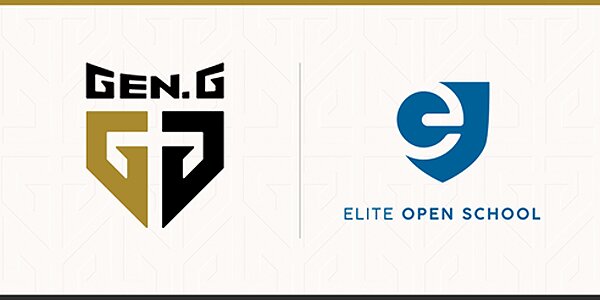
On June 24th, globally recognized organization, Gen.G Esports, has recently partnered up with a global education company known as Elite Education Group to announce plans in opening ‘Gen.G Elite Esports Academy’. As an international academy network designed to provide American-style education for middle and high school students in the esports and entertainment area, the Academy is planned to open its first campus in Seoul in September.
The entire curriculum at Gen.G Esports Academy will be in English and is intended so in allowing students and players to have a much easier transition when they go overseas. All esports-related training will be identical to that received by current Gen.G players, and training facilities will also be the same. In addition, outstanding graduates will be given opportunities to join either Gen.G or other famous organizations when they are ready to join a team.
Q. Is Gen.G Esports Academy focused mainly on education or creating future pro gamers?
Chris Park: Thanks to our partnership with Elite Education Group, we don’t have to choose between the two. Initially, we aimed to target both groups when forming our institution. Both Elite Education Group and Gen.G have worked with students and gamers from a variety of backgrounds and specifications. This is why we are able to provide an individually-specific program, designed for each individual.
Arnold Hur: This question actually defines what we aim to accomplish with Gen.G Esports Academy. Previous methods of education would only allow us to pursue one or the other, but we have a strong desire to provide a solution for both. Just as athletes are recognized in a university program, we want to do something similar for those who find talent in the esports area.
Easy transition overseas, identical training to current pros, and outstanding graduates receiving opportunities to play with top teams make it sound as if all of this is too good to be true, for the prospective pros and for their parents. Plus, it’s not just any organization that is saying this. It’s Gen.G, and we don’t mind Gen.G exuding with all that confidence. If Gen.G are to achieve what they say they want to achieve, this new partnership with Elite Education Group could represent an incredible role model for what esports and education can achieve together.
If everything goes as Gen.G says, you would have a kid that speaks fluent English while playing for big teams around the world, all the while earning a big paycheck and eventually become a gaming superstar. However, one must consider the reality of all this. Many experts suggest that all considerations need to be treated equally and, only then, can a logical decision be made. It’s not to say that one is wrong, but the need in being more rational when considering the odds simply cannot be understated. If the kid is someone who wants to be better than Faker, it’s even more disheartening. Even for a lot of the best players in the LCK, many who sacrifice sleep to have more practice time still find it difficult to play in the World Championship. There’s a sense of difficulty in mastering one single trait, but trying to master both education and esports all at the same time may turn out to be an effort gone and wasted.
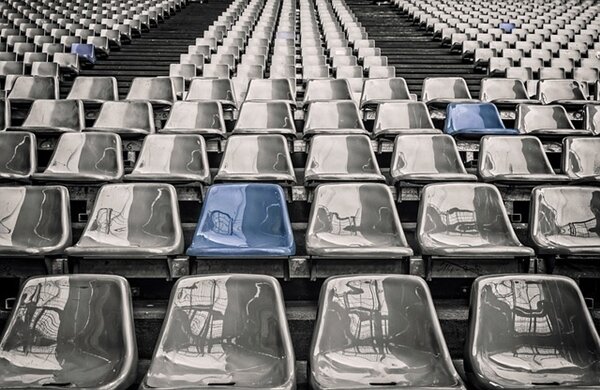
If I can give the answer first, it would be, “No. You can’t.” Telling the same story over and over again in hopes of getting the point across doesn’t seem all that unnecessary because of how important it is. Focusing solely on practice, many say that it was more intense back in the StarCraft 1 days. To put it into perspective, we asked former SC1 pros all the way up to current LCK pros for their opinions on this topic.
SKT T1’s Kim “Khan” Dong-ha expressed his opinion. “After getting over that phase with your talent being the primary tool, many people estimate the talent to effort ratio to be 5:5. Players here have already met their limit of how far talent can take them. Now, it’s all about effort. For League, there is always that next step a player can achieve through how much effort he puts in. I’d like to think that I’m a hard worker, but the hard work in this context isn’t just your typical kind of effort. Talent is needed to supplement hard work.”
Korea National Team’s top laner Kim “Kiin” Gi-in from Afreeca Freecs expressed a similar opinion. “I believe that, without talent, you can’t become a pro gamer, no matter how hard you work for it. However, after a player gets to a certain phase, the amount of talent to effort needed for a player is around 5:5. Trusting only your talent without putting in the effort will indeed set you backwards.”
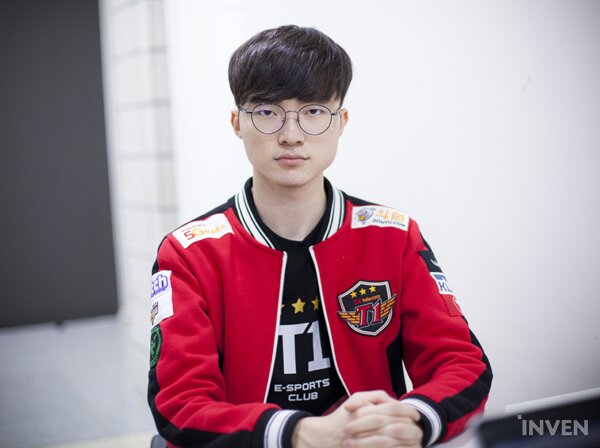
Worldwide star Lee “Faker” Sang-hyeok expressed his thoughts. “I think people are disconnecting talent and effort far too much. I believe talent can be derived from hard work. That is where I measure the ratio to be 5:5. If I may share my thoughts to prospective gamers, know that sufficient talent to constantly maintain high rank in Challenger is the minimum. If you find yourself having difficulty to do that, you should seriously consider whether this is right for you or not.”
Legendary StarCraft 1 player Lee “FlaSh” Young-ho shared his insights on the topic. “You have to be the best, both in talent and effort. If I must measure it, I’d say the ratio is 5:5, but I would say putting in hard work constantly without rest is a talent in its own. This might be hard to phrase, but having seen so many successful gamers and myself being one of those examples, I can say that there is one specific element for each person that makes them special and eventually star players. The ability to identify your own special element might be a talent in itself.”
With all these answers coming from top-class players, they seem to be in agreement. When attributing talent numerically with a maximum value of 100, anyone at an attribute of 95 or higher would require a talent to hard work ratio of 5:5 in order to compete. Also, there is a need to understand that ‘hard work’ as described here are different from what we consider to be hard work. It’s next level sort of hard work, and that’s why some of these players have mentioned that putting in this type of effort in your practice might be a talent of its own. This was coming mostly from top players from a team-oriented gaming environment. You can visit Harvard, and none of the students will tell you, “I have no talent. I just put in a crazy amount of work.”
Oppositely, the players at a slightly lower tier than our first batch of players emphasized the importance of talent even more than our first group. Many expressed 8:2, in favor of talent over effort, while others expressed 7:3 and 6:4 in the same order. Outside of talent and effort, some also mentioned luck as an extra element, saying that meeting the right team and the right teammates can allow you to achieve what you couldn’t have achieved with talent and effort alone.
When asking former StarCraft pros, players who did not have teamwork as requirement, over 95% of them expressed similar opinions on the topic. “As long as it’s not an otherworldly amount of practice, it is pretty difficult to overcome talent with anything else.” “We say effort is the lesser being, and I’ve seen people fail in trying to prove that wrong.” As such, importance of talent was heavily emphasized.

In the past, retirement for pro gamers had not much to celebrate about. It might also be true for retired sports athletes, but for pro gamers, coming from a much younger industry and not enough recognition for gaming careers in general meant that it was harder for our retired pros. Some of the more famous players might become a commentator or even a team coach, but those are pretty much your only options.
While similar today, it has gotten much better. The era of content creation is now upon us and the influence it has on today’s world has surpassed everyone’s expectations. Labeling yourself as a pro gamer can give you some quirks when starting out when compared to a regular person, but most former pros end up doing something that’s completely unrelated to gaming.
After his retirement, Lee “FlaSh” Young-ho, gave his honest thoughts on life after retirement through his Afreeca stream. He also gave a very special message for all those who dream of becoming a pro gamer one day. “If the kid’s desire is genuine, there’s no harm in supporting the dream. Back in the day, there wasn’t much to do after retirement. You could be a coach, and if you were good at talking, you could consider being a commentator”
“Things are different now. Good options nowadays include YouTube and other streaming platforms. If you were previously a successful gamer, it will definitely help out, but it won’t guarantee you anything. Oppositely, just because you weren’t that famous as a pro gamer doesn’t mean you won’t be as a streamer. There’s always a benefit of being a former pro.”
“Plus, if you worked really hard during your pro career, you will have learned many things. You will have learned these things faster than other people your age. You need to be sure that you have enough before you choose to retire,”
A relevant figure since the early days of competitive League, Hong “MadLife” Min-gi added his thoughts. “In my case, I think back to the day when I retired in 2017. ‘What can I do after retirement?’ I had always dreamed of becoming a coach, but with content creation getting more and more attention, I decided to stream as a hobby. It was definitely fun, and I liked the lifestyle of it all. I was lucky enough that my experience as a pro helped with this endeavor, and now many people are enjoying my broadcasts.”
“Although, I’ve seen other former pros consider streaming, and some people eventually fail because of their lack of personality, popularity, or experience. You have to know what sets you apart. If I can humbly suggest to those dreaming of becoming a pro gamer, you need to realize that while gaming can be enjoyable for everyone, being a pro is completely different. You need to set clear objectives for yourself, and once you have achieved all of that, it’s important to know when to step down.”
After announcing his retirement earlier this year, successful streamer Kang “Ambition” Chan-yong gave his advice. “The ones that are willing to fight to become the best and never give up until that is achieved are the ones who should be getting into this field. The goal for every pro gamer should be about achieving success in a fair and competitive environment. It shouldn’t be about just having fun, making a lot of money, or even going overseas.”
“Just because you’re young and a student, nothing changes. If you have not experienced that feeling of working towards getting what you want, you will struggle. Even if you don’t see yourself becoming the best player, at least go in there and fight fearlessly. There’s no other option. Compete fearlessly, and leave once you are satisfied. You can always learn something by trying your best. Even though you are starting your adult life later than everyone else, the things you learn as a pro gamer will be very helpful. No matter where you are in life, give it your all and go one step at a time.”
“If you really want something truly meaningful in life, don’t look at what job it is nor how much money it gives. Think of what you truly value in life. If those values become set in concrete for you, you will be able to set your direction. Those values need to be set independently and need to be thought over long and hard.”
Former StarCraft 2 pro Jo “Golden” Myeong-hwan’s case was quite different. Obviously, no one can describe him as a failed pro gamer, but his accomplishments and general popularity was not really up to the level of FlaSh, Ambition, nor Madlife. When he retired as a pro gamer, he focused on his education and attended Seoul Institute of the Arts. Now, he is preparing a theatrical play based on the life of a pro gamer named ‘PLAYER’ as the play’s leading director.
Golden mentions that “before you think about wanting to become a pro gamer, think of what you want to do much later in life. It’s usually from middle to high school when kids typically consider doing pro gaming, but it’s also important to understand the many things you have to sacrifice in order to become a pro gamer.”
“Even with those sacrifices, if you are okay with becoming a pro gamer, I think you should definitely give it a shot. Some of these experiences you can gain as a pro gamer can’t be traded for anything else in life, and you learn a great deal of independence along that journey. However, you must understand that your life will be different from any other normal person’s life. It won’t be easy.”
“If you weren’t famous as a pro gamer, life after retirement will be even more difficult. It’s not about differentiating right or wrong, but in Korea, you will find that education and experience go a long way, and experience as a pro gamer just doesn’t have as much of a merit as other professions do.”
“I sometimes see former pros aspire something completely new, but abandoning gaming, the one thing that’s defined our lives for so many years, in trying something entirely new is not an easy process, to say the least. You would literally be starting over with nothing on your hands, and after retirement, you’d probably be around your late 20’s.”
“It’s important to not limit yourself to this little world that we have. It’s easy to fall into that because gaming was everything for us. After retirement, you will come to realize that the world is much bigger than what you had previously imagined. It doesn’t matter how famous you were as a pro. Every pro goes through this relentless phase of competing against someone that you know you have to defeat. If not anything else, living the life of a pro gamer teaches you to be fierce. That fierce, competitive mindset will be your biggest asset when stepping out into the real world.”
“Also, if you happen to go overseas, think about what you could do. Typically, pro gamers have much wider access to the world we live in compared to other people our age. The way we look at our world, from a linguistic point and beyond, can be a huge advantage for our lives. In the end, it’s what you make of it.”
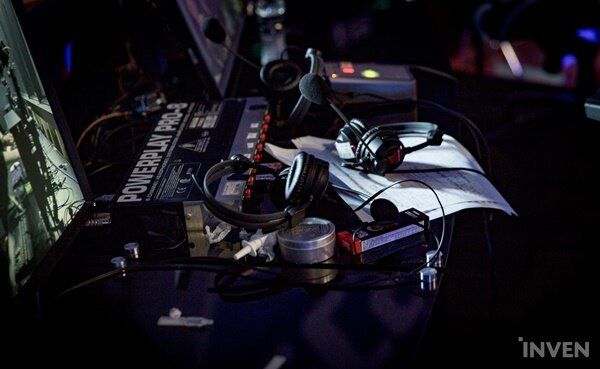
Just twenty years ago, no one expected gaming to evolve into a watching experience similar to sports. What’s more is that kids born in the late 90’s and onwards see game broadcasting and the esports industry all too naturally. As such, we see our modern society moving at a very progressive pace, and that generation simply cannot think the way that the previous generation does.
When heading to work, we call that “another day of war.” People usually don’t like the idea; it’s hard for people to accept anything new. We’d rather have the security of knowing what’s going to happen, but if we want to give the best advice to our child, we need to understand things from their perspective and learn the basics of what they know. It’s not good enough to only know their outer layer. You need a complete set of knowledge and background in order for our child to really open up and have a conversation.
Learning about a new concept isn’t as easy as it sounds. Someone telling you to do it doesn’t make it easier. You need self-determination. This becomes more important the older you get. In order to persuade their parents, kids can tell you about a pro gamer’s annual salary, his viewership on stream, and even the bright future that esports promises to have. While all of those things may be true, they are only the tip of the iceberg, and we need to know what’s on the other side of that light.
A good example is understanding the average annual salary of LCK players reported in 2018 to be around 150,000 USD. This is mostly due to the superstars we know today who are doing the heavy lifting of significantly raising that average. It’s a misconception commonly referred to as an “average error.” Obviously, if you are good enough to be in LCK, you are guaranteed at least a minimum salary of around 16,000 USD, thanks to Riot’s regulation, and mostly, players do end up making more money than what one would make initially working at a large corporation. It’s definitely not a small amount of money, but understanding what ‘average’ is in this context needs some reevaluation.
There are many people who pursue a career in gaming that simply do not realize this fact. Everyone dreams of becoming the next Faker. However, we can only have one Faker at a time. Dreaming big is fine, but you do need to consider all the risks of possible failures. While there’s still room for improvement, there are more things for a pro gamer to do nowadays when compared to what it used to be.
There are many cases where one follows the path of becoming a pro gamer only to find himself in a similar but different field (scouting, coaching, office work, etc.). You have a higher chance of failing than you do at succeeding when becoming a pro gamer, but we need to allow that failure to become a successful failure as much as possible. The pro scene may see it only as success or failure, but many former pros and even former prospective gamers have learned something along the way and have continued on with their journey.

If we summarize what a parent can do for a child, the parent must completely understand what it means to be a pro gamer. This means studying and getting information. Then, look to see how genuine your child is about all of this. Check to see how talented he is, and if you sense potential, support him with all you have. That’s the best a parent can do. The rest is up to the kid.
Understanding how genuine a kid is in his pursuit is important. Is he saying this just like the million other things he said he wanted to be? Has he always been this type of a kid? If not, and you can sense that he is absolutely sure that this is what he wants, it might be worth taking a listen to because it can take great courage for a kid to express what he truly wants in life.
If you found his dream to be genuine but his rank in the game isn’t as high as one would like it to be, have him take his time, especially if he hasn’t played the game for a long time. The fact that he has found something he truly wants to pursue in life can be reason enough to watch over his progress. However, time spent without realizing potential is something we do need to avoid. If the child is unable to reach a certain goal within the given time, it might be best to look for alternatives.
Before all of this, though, one needs to understand esports. Full-on support and compliments can be meaningless if we don’t know what we’re supporting and giving compliments to. It might be obvious, but many people still do not truly understand what esports is, understandably with how young the industry is. We might not have what it takes to give a 100% sure answer to our kid during an important time in his life, but at the least, shouldn’t we have what it takes to set our kid to a more preferable direction?
Sort by:
Comments :0





